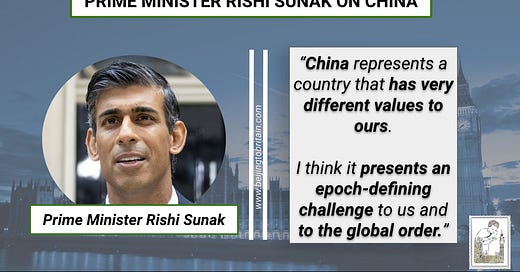Hello,
The Integrated Review Refresh has finally been published. Per the Government’s press release, the IR23 “was commissioned to respond to emerging geopolitical threats, from Russia’s illegal invasion of Ukraine to China’s economic coercion and increased competition between states.” It includes a substantial section on the UK’s updated approach to China under Prime Minister Rishi Sunak, and details about new strategies and policies for managing the relationship.
The IR23 describes China as an “epoch-defining challenge”, and states it will “increase our national security protections in those areas where Chinese Communist Party actions pose a threat to our people, prosperity and security.” However, the British Government will “engage directly with China bilaterally and in international fora so that we leave room for open, constructive and predictable relations” - after all, “diplomacy is a normal part of state-to-state business, and supports the national interest.”
The IR23 sets out four ways the UK will seek to protect its strategic interests.
Shape the international environment. The UK will actively shape, balance, cooperate and compete to create the conditions, structures and incentives necessary for an open and stable international order and to protect global public goods.
Deter, defend and compete across all domains. We will strengthen our integrated approach to deterrence and defence, to counter both state threats and transnational security challenges. We will also work to uphold strategic stability, establishing new frameworks and building a new international security architecture to manage systemic competition and escalation in a multipolar environment.
Address vulnerabilities through resilience. We will develop the UK’s approach to resilience, addressing the economic, societal, technological, environmental and infrastructural factors that leave the UK exposed to crises and hostile actors.
Generate strategic advantage. We will reinforce and extend IR2021’s focus on strategic advantage – the UK’s relative ability to achieve our objectives compared to our competitors. We will cultivate our national strengths and update our tools of statecraft to maintain the UK’s freedom of action, freedom from coercion and our ability to cooperate with others.
Top line take: Having raised it in yesterday’s briefing note, and co-written evidence for Parliament on the issue, it’s good to see an emphasis on increasing funding for the UK’s China capabilities. The admission that “today’s international system cannot simply be reduced to ‘democracy versus autocracy’, or divided into binary, Cold War-style blocs” is a positive step in the right direction - but ultimately none of this matters without funding and political drive behind it. For example, it’s good to state that “diplomacy is a normal part of state-to-state business, and supports the national interest” with regards to making the pitch for stabilising the relationship with China, bringing the UK in line with allies, but this must come with the British Government coherently shoring up its own domestic resilience and properly communicating to Westminster, international partners, and British voters what the actual plan is.
- Sam Hogg, Editor.
Today’s briefing note for paid readers:
draws out the critical China-facing elements of IR23
pulls the China section directly from IR23 for easy access
rounds up the instant reaction from politicians and politicos across SW1
includes snap analysis from Westminster



